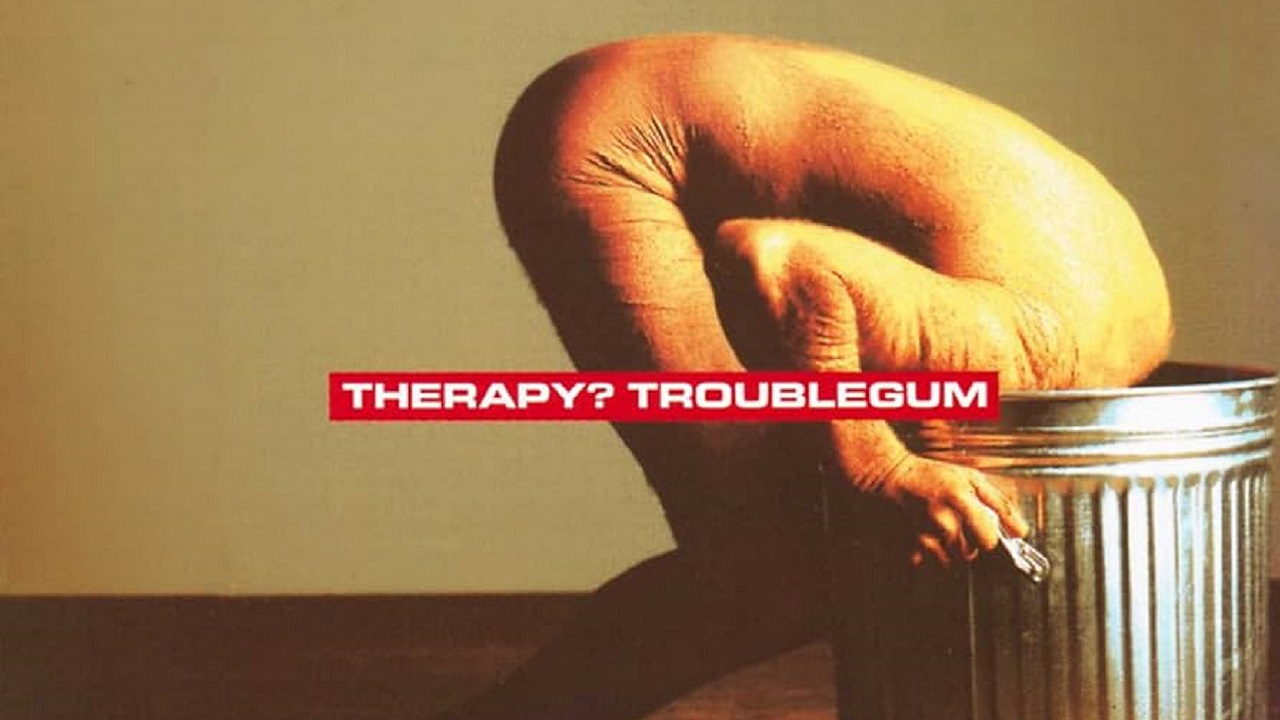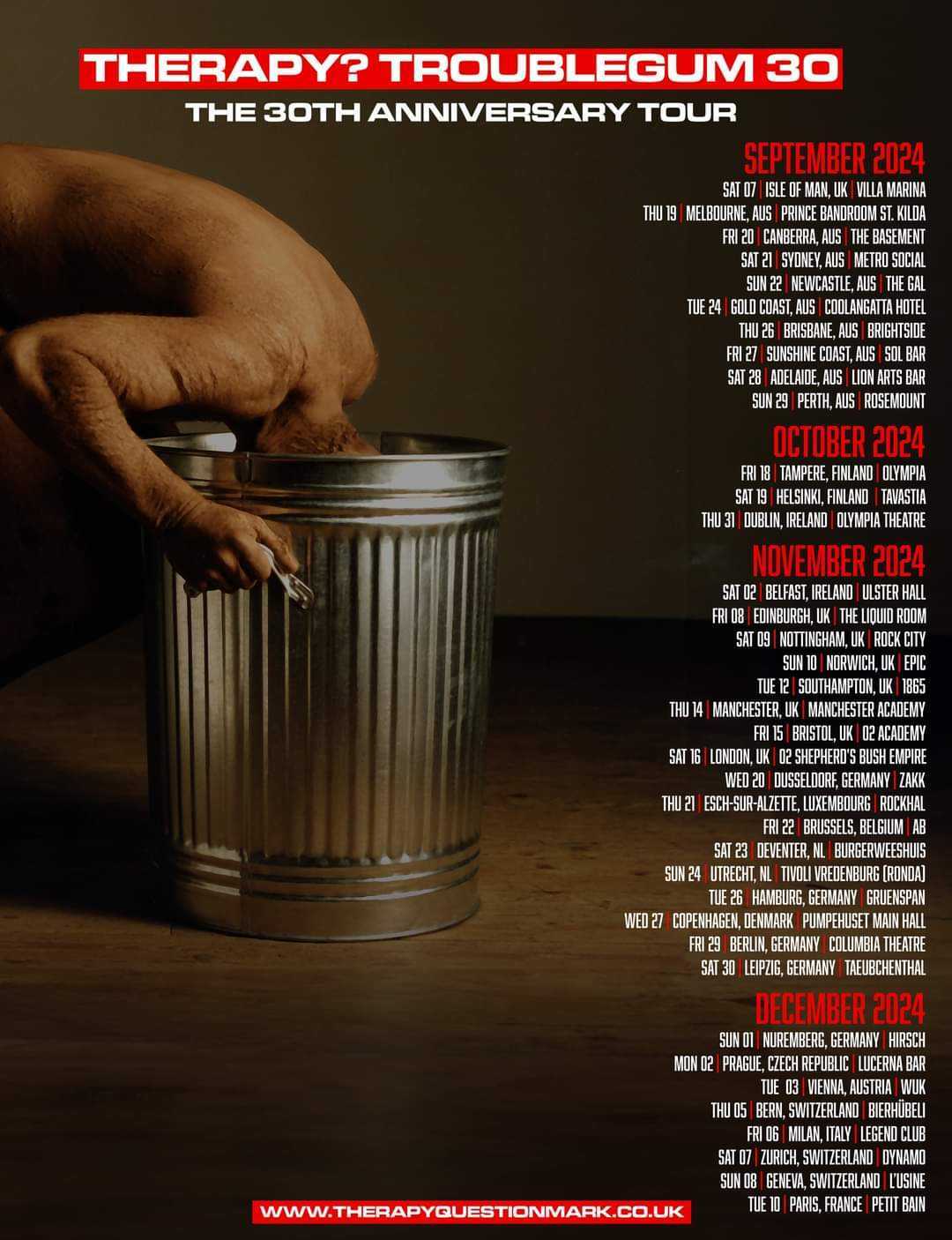
Storming out of Northern Ireland in the early 90s, Therapy? were as much a confluence of their influences as they were a distinctive creative force in their own right. Drawing on everything from post-punk, noise rock, metal and dance, the band's abrasive style on their early records nonetheless saw them steadily climb up the charts in the UK.
But if debut Nurse established them as discordant malcontents with an ear for massive melodies, the band's second full-length Troublegum was about to blow the doors of success wide open to them. Sleeker, more melodic and with a sound that frontman Andy Cairns describes as "like The Undertones meets Metallica", Troublegum took Therapy? into the top 10 in the UK, peaking at no. 5 and turning them into unlikely stars.
30 years and 14 more albums on, the band are still a beloved cult phenomenon the world over. With Therapy? celebrating the 30th anniversary of Troublegum later this year - full list of tour dates below - we sat down with Andy to get the ultimate track-by-track guide to one of alt. metal's greatest albums.
"I've learned to live with Troublegum a lot more," Andy admits. "At the end of the 90s, when we hit the nadir of our popularity and before things picked back up, it did feel a bit like 'is this all we have - this record that resonated with people once?' What changed is, we keep playing it and seeing younger people getting into it. That's the thing: it'll never go out of fashion, because people will always feel loneliness and rage. When we realised just how much this record meant to people, it became so much more precious to us."

1. Knives
"Knives is a Samuel Beckett-esque ode to impotent rage. Some people think it's a really angry song but it's not Pantera; we're not saying 'I'm gonna fuck you up with knives!', slobbering on the mic. It's about failure, about impotent rage and being that guy where everything is going wrong, feeling left out.
Someone at a Silverfish gig gave us microdot acid and we went to party with them afterwards in their residential studio. Michael [McKeegan, bass] came downstairs at one point and saw me tripping my nuts off, going for the cutlery drawer. I don't think I was planning on cutting anything bigger than a lemon, but he came over and guided me away. He told me, 'I had to hide the knives', which gave us the idea [for the chorus]."
2. Screamager
"We went on tour with Helmet in America and we just loved the way they used the power of the riff to stop and start, with these staccato blasts. Lyrically, Screamager was just about growing up and really wanting something to hang onto. The way the media portrayed Northern Ireland [because of the Troubles] gave us all these hang-ups, in addition to the usual hangups that a teenager would have about finding someone to love or whatever."
3. Hellbelly
"The lyrics to Hellbilly dealt with these chancers we knew back home. Relgion was this umbrella of abuse that people could hide behind, they'd get away with siphoning money away from the council and from communities, even before you get to the whole paramilitary thing.
We had a few American-style mega churches that were a haven for these people who'd come out of prison, or had got into trouble with the organisations. Hillbillies moved to the USA and Appalachia from like the Ulster Scots and Irish, so we had this term to play with that - 'hellbelly'."
4. Stop it You're Killing Me
"The intro for Stop It You're Killing Me was quite epic - I suppose you could trace it to something like Ice Cold Ice by Husker Du or even Walk All Over You by AC/DC. The song itself was very anti-authoritarian; famously the one thing that could unite Irish people was punk, so that was where thenidea for it all came from."
5. Nowhere
"Nowhere is arguably one of our best known songs globally. Lyrically, it was looking at failure and how your life might not pan out. Especially as someone growing up in Northern Ireland in the late 70s and 80s, it was a question of what kind of life I was going to have.
I was also reading a lot of Spike Milligan, so decided it needed to be a bit dark but absurd, so came up with the line 'Heaven kicked you out/you wouldn't wear a tie' rather than having it all woe is me."
6. Die Laughing
"Die Laughing was quite naive for us. I was basically ripping off Fugazi! When we started the band we moved from our homes in market towns to Belfast, because it was near to where we wanted to be. I took acid one night, and I forgot my name.
Fyfe's friends came over and I was like Homer Simpson, 'what's your name?' 'I don't knooow'. I really couldn't remember my name - there was a vague sense of panic, because people in my family had suffered from dementia and I remember thinking 'this is what it must be like, not having control of your consciousness.'"
7. Unbeliever
"Because we'd been so impressed by Helmet, we called Page Hamilton up and asked him to play guitar, so he gave us this incredible solo. When it was all finished, we desperately wanted that as our single. We were summoned to a meeting with the label and they said 'we've never interfered before, but we think you'd be making a huge mistake releasing this as the first single.' I guess they were right, considering how Nowhere did!
The song itself is about how lonely I felt growing up, and how even though I'd found this band and was spending all this time with these guys, that loneliness had never really left me."
8. Trigger Inside
"Trigger Inside was about unfulfilment and impotent rage again. It was about watching the world go by and not really feeling part of it - 'here comes a girl with perfect teeth, I bet she won't be smiling at me' . It's the song that probably has the most Metallica influence to it.
I was actually reading a book about Jeffrey Dahmer at the time. There were several innocuous things that they mentioned had set him off, and it got me thinking about something that happened to me as a child. I moved schools when I was five and my mom gave me a little cake or something to give to the teacher, bless her. I gave it to the teacher and I remember waiting for my mum to pick me up at the end of the day and watching that teacher walk out and drop the cake in the bin. I was devastated. Little things can seem so mundane, but they can leave huge scars on the psyche, but I'm in no way comparing myself to Jeffrey Dahmer!"
9. Lunacy Booth
"Lyrically, Lunacy Booth harkens to the missionary status of a lot of relgion in Northern Ireland, this blanket that can be cast over all sorts of misdemeanours. Silver Fish's Lesley Rankine sang on that for us, because we'd become really good friends when we toured together. We wanted an abrasive voice to shout 'Christ' and she was our favourite choice."
10. Isolation
"Joy Division meant so much to me when I was 15/16. We were a bit worried about doing a fairly recent cover on the record, but then we spotted The Pixies had done a Jesus And Mary Chain cover on Trompe Le Monde so it was like, 'well, why not?' The way we did it fit in sonically and aesthetically with Troublegum I think."
11. Turn
"I was reading a great book called Storming Heaven by this guy Jay Stevens which is basically all about the 60s counterculture and how the CIA were involved. There's this theory that they introduced LSD into the counter-culture to disrupt any revolutionary ideas they might have. One of the chapters was called Turn And Face The Strange and I honestly did not realise that was a David Bowie lyric! It became a song about hiding in plain sight, wanting to get revenge on someone - watching their every move and waiting for the day where you make them see the world through your eyes.
We were on a festival bill in Belgium with David Bowie a few years after Troublegum came out and he was on two bands after, and about three songs into the set I look over and standing by our monitor was David Bowie! He watched the whole thing and we played Turn, so I started to worry about having to walk past him to get to our dressing room, thinking he's going to say 'you thieving Irish toerag!' but he just went 'great energy!' I was off the hook."
12. Femtex
"Femtex was written under the influence of One by Metallica. It's also the one track on the album I feel was very naive now, because it was about people we knew who'd experienced sexism. We had a lot of it around us, where we'd have a girl on the crew who would be talked to differently to everybody else."
13. Unrequited
"Unrequited was a strange old song. We were talking about maybe putting Opal Mantra on the album as we'd already had a lot of success with it [as a single]. It's got weird chords and didn't have any lyrics right up until we actually recorded it.
I ended up writing about loneliness again and the final line was 'I hope that you understand'. We'd tried it a few times and just couldn't get it right, though. [Troublegum producer Chris Sheldon]'s wife at the time was Eileen Rose and she'd sung with a few bands, so we asked her to do it, but she couldn't get it to work either. Eventually we got Chris to sing it, in this weird high falsetto voice and to this day it's a bastard to sing live."
14. Brainsaw
"The lyric 'I'm in hell and I'm alone' was almost the ultimate payoff for the album; it wasn't written about my childhood in particular, but about loneliness as a concept. We made this record when I was 28 years old and people would genuinely say to me, 'should you be writing about loneliness and angst when you're 28?' My point was, I don't go into a kebab shop on a Saturday night to kick fuck out of someone. If someone cuts me up on the road I don't jump out and smash their car up.
These things happen because people don't have an outlet or someone to talk to. Well, the loneliness never leaves you - the rage never leaves you. Brainsaw was about that, this loneliness, this betrayal, needing someone to give me direction."

Therapy? are set to celebrate the 30th anniversary of Troublegum by playing the album in full this winter. See the full list of dates below:








